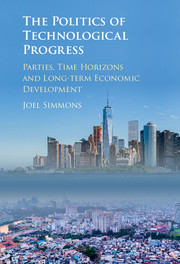Book contents
- Frontmatter
- Dedication
- Contents
- List of Figures
- List of Tables
- Acknowledgments
- 1 Introduction
- 2 A theory of political parties and technological progress
- 3 An empirical investigation of political parties and technological progress
- 4 Weak institutionalization and myopic policymaking
- 5 State failures, market failures, and technological progress
- 6 Conclusion
- A Appendix to Chapter 1
- B Appendix to Chapter 2
- C Appendix to Chapter 3
- References
- Index
4 - Weak institutionalization and myopic policymaking
Published online by Cambridge University Press: 13 July 2017
- Frontmatter
- Dedication
- Contents
- List of Figures
- List of Tables
- Acknowledgments
- 1 Introduction
- 2 A theory of political parties and technological progress
- 3 An empirical investigation of political parties and technological progress
- 4 Weak institutionalization and myopic policymaking
- 5 State failures, market failures, and technological progress
- 6 Conclusion
- A Appendix to Chapter 1
- B Appendix to Chapter 2
- C Appendix to Chapter 3
- References
- Index
Summary
In Chapter 3, we learned that where well-institutionalized parties govern, countries have higher levels of technological progress. The reason for this is that when they rule, institutionalized parties do a better job mitigating the market failure that undermine firms’ incentives and capabilities to innovate and to adopt frontier technologies.
However, even as those results support the theory Chapter 2 develops, one issue remains unresolved. The theory posits that well-institutionalized parties better ameliorate those market failures specifically because they have longer time horizons than poorly institutionalized parties do. While the results in the last chapter lend themselves to that interpretation, they do not test it. In this chapter, I investigate more directly whether policymaking horizons extend farther into the distance when institutionalized parties rule.
Testing the time horizons proposition requires that we think in terms of a different set of dependent variables, however. Specifically, it requires that we focus attention on a policy area that, according to existing scholarship, has observable, easily-attributable, and quick-arriving economic benefits and also significant and deferred economic and political costs. If poorly institutionalized parties favor these policies more than well-institutionalized ones do, we can state with more confidence that the former's policymaking horizons are shorter than the latter's.
Fortunately, a policy area that exhibits the relevant temporal characteristics is readily available. The opportunistic use of fiscal and monetary tools to create economic booms ahead of elections and recessions afterward is the canonical short-sighted economic strategy. Engineering election year economic expansions can be a boon for an incumbent's re-election prospects, because such behavior can increase employment, economic growth, and citizens’ disposable income immediately before an election. The good economic times cannot endure, however (Friedman, 1968). And even worse, election induced oscillations in economic policy and macroeconomic outcomes can generate serious post-election economic and political costs (Frey and Ramser, 1976; Schultz, 1995).
If I am right that weakly institutionalized parties have short time horizons, it follows that when they rule, they will be quite amenable to inducing election-year business and budget cycles. Well-institutionalized parties will rely less on such behavior, however.
- Type
- Chapter
- Information
- The Politics of Technological ProgressParties, Time Horizons and Long-term Economic Development, pp. 113 - 144Publisher: Cambridge University PressPrint publication year: 2016



